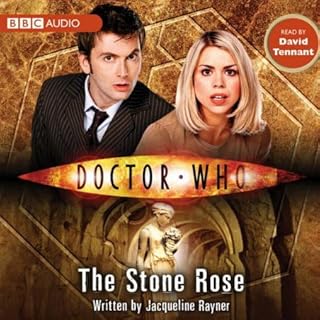W. Doug Bolden
- 3
- reviews
- 0
- helpful votes
- 4
- ratings
-
Doctor Who
- Hornets' Nest 1 - The Stuff of Nightmares
- By: Paul Magrs
- Narrated by: Tom Baker, Richard Franklin, Susan Jameson, and others
- Length: 1 hr and 11 mins
- Unabridged
-
Overall4 out of 5 stars 84
-
Performance4.5 out of 5 stars 62
-
Story4 out of 5 stars 61
Responding to an advert apparently worded for him alone, Captain Mike Yates (retired) is reunited with a ghost from the past. But why has the Doctor, that mysterious traveller in Time and Space, sent for his former UNIT acquaintance? Trapped by a horde of vicious creatures in an apparently innocuous English country cottage, the two old friends are on the brink of an enormous adventure.
-
4 out of 5 stars
-
Charming? Yes. Doctor Who? Maybe.
- By W. Doug Bolden on 03-29-10
- Doctor Who
- Hornets' Nest 1 - The Stuff of Nightmares
- By: Paul Magrs
- Narrated by: Tom Baker, Richard Franklin, Susan Jameson, Daniel Hill
Charming? Yes. Doctor Who? Maybe.
Reviewed: 03-29-10
Tom Baker's [Fourth] Doctor was a master of quick, quirky quips and turn-on-a-dime reaction. With a booming voice, instantly recognizable scarf, and a series of memorable facial expressions: he still is /the/ Doctor for many fans of the long running series. While all the other living Doctors from the original series have showed up in third party materials, especially the Big Finish radio productions, Baker has tended to stay aloof from the role, excepting bits here or there, since he departed in 1981. Getting any bit of Whoniverse with Tom Baker in it is a delight: Hornet's Nest was absolutely a must buy.
It IS charming and interesting. Baker's voice is magnificent. Franklin, returning as once-Captain Yates, is spot on. The foley effects and soundtrack are all top notch. The story, too, is appropriately weird and spooky and ends only after hooking you in for more (parts 2-5 of Hornet's Nest). It is just not quite Doctor Who.
The presentation has a lot to do with this. It is not an audiobook, nor is it exactly full cast. Somewhere in between. Most of the 72 minutes is taken up by either the Doctor or Yates retelling what happened to them, with a second voice or so added in during key dialogues. While I will never criticize Baker's speaking voice, it does break the weird, sporadic quirk that was a staple of his version of the Doctor. Only in one or two short spots does the cadence we are used to seep out.
The Tardis is mostly mentioned, not used (short time jumps, apparently, took place). The rest of it surrounds 7th-9th season [Third Doctor] like storyline of him being in one place for some time. It even has an [ex-]UNIT member.
Still, I chuckled at the explanation of why the Fourth Doctor got captured so often (the best way to see inside the secret fortress) and I'll have to hear more: give it time to bring out the Tardis and more "Who"-esque stories. Just, fans, be aware that it is Baker, but not quite as you remember.
Something went wrong. Please try again in a few minutes.
You voted on this review!
You reported this review!
5 people found this helpful
-
Doctor Who: The Stone Rose
- By: Jacqueline Rayner
- Narrated by: David Tennant
- Length: 2 hrs and 22 mins
- Unabridged
-
Overall4.5 out of 5 stars 1,304
-
Performance5 out of 5 stars 1,007
-
Story4.5 out of 5 stars 999
Mickey is startled to find a statue of Rose in a museum; a statue that is 2,000 years old. The Doctor realises that this means the TARDIS will shortly take them to Ancient Rome, but when it does, he and Rose soon have more on their minds than sculpture.
-
4 out of 5 stars
-
Be Careful What You Wish For
- By Vincent Tume on 01-11-07
- Doctor Who: The Stone Rose
- By: Jacqueline Rayner
- Narrated by: David Tennant
Back and forth to solve the answer, again...
Reviewed: 01-21-10
When the Doctor finds a statue of Rose, he and her head back to the time the statue was apparently made to find out why. Here they come across a plot involving a sculptor with unusual gifts, a woman who can predict the future awfully well, and a case of several missing persons (mostly slaves). Being the Doctor, he has stumbled right into the middle of plots nefarious.
Jacqueline Rayner asks the question that a lot of us have wondered at some time or another: why doesn't the Doctor use his time machine more as a time machine? Why doesn't he fly off to some distant future or another and get a miracle cure, or a miracle machine, or go back prior to things getting really bad and fix them at the start? The mythos of the show (and additionals) set down some rules to prevent this; but it always feels like the rules could be broken a little bit here or there. This is not to spoil exactly how things go down, but you do find one answer: it feels a little like a cop out. As the reader (or, well, listener); you feel little left out when everything can be solved by creative off-screening. The last third or so of this book deflates, rapidly, whatever tension that first two thirds has established.
Not poorly written, though, and fairly interesting; and David Tennant does a wonderful job as narrator (especially delightful is when he switches from his reader's voice to the voice of the Doctor). On all technical accounts, I was pleased. I was just not too sure about the way it was all resolved. Fits right in with the "a little too magical" elements of the 10th Doctor's first season, I suppose.
Something went wrong. Please try again in a few minutes.
You voted on this review!
You reported this review!
2 people found this helpful

-
Fry's English Delight
- The Complete Series 1
- By: Stephen Fry
- Narrated by: Stephen Fry
- Length: 1 hr and 43 mins
- Unabridged
-
Overall4.5 out of 5 stars 316
-
Performance4.5 out of 5 stars 229
-
Story4.5 out of 5 stars 228
Stephen Fry hosts four programmes on the joys of the English language - as heard on BBC Radio 4, including Current Puns. Why does our language groan with the weight of puns? What exactly is a pun? And who, or what, is the Thief of Bad Gags?
-
4 out of 5 stars
-
Good, but could have been better
- By W. Doug Bolden on 01-20-10
- Fry's English Delight
- The Complete Series 1
- By: Stephen Fry
- Narrated by: Stephen Fry
Good, but could have been better
Reviewed: 01-20-10
I love Stephen Fry and I love etymology, so there was a good bit for me to love, here. The overall package was a little lacking, though. The basic format is to take puns, metaphors, cliches, and quotes and to discuss them as four separate subjects. The "puns" and "quotes" episodes bring up a lot of interesting points about why puns are funny and what makes a good quote, and the "metaphor" episode makes an interesting point about metaphors being a birthing ground for new language; but, on the other hand, the metaphor episode seems poorly edited (ending really abruptly) and full of conjecture and the cliche episode could have probably been cut with no significant loss. My final take is that Fry fans and linguophiles especially should check it out and most interested in playing around with language will enjoy at least one of the four episodes.
Something went wrong. Please try again in a few minutes.
You voted on this review!
You reported this review!
11 people found this helpful



